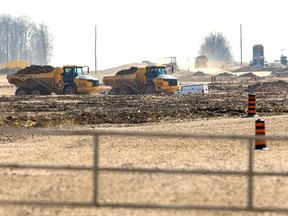
Millions in cash, a big key to unlock future growth – and provincial muscle to help.
Advertisement 2
Article content
“Frustrated” only weeks ago by what he called the slow pace of compensation talks, after his municipality lost a big chunk of land to neighboring St. Thomas to help it land a $7-billion Volkswagen factory, Central Elgin’s mayor was in a much better mood after an “historic” deal with the city was announced Friday.
Article content
“I feel a lot better today than I did a month ago,” Andrew Sloan said. “I think there were some delays in the process, which could have been avoided, but ultimately, that’s the past (and) the future is good news for Central Elgin.”
Under the compensation deal, Central Elgin will get $15 million from the city – two-thirds of it up front, the rest over five years – and be able to tap into a costly service from its neighbors, wastewater processing, to help unlock the potential of industrial and residential land in the municipality.
Advertisement 3
Article content
The deal also dangles the prospect of turning one of the largest tracts of surplus provincial land in the London region into future housing, with the province working with Central Elgin to sell the sprawling former St. Thomas Psychiatric Hospital lands and repurpose them for housing.
The 162-hectare (400-acre) site was singled out in last month’s Ontario budget as one of two surplus land tracts for which the province will spend nearly $100 million under a pilot project to help make them suitable for residential use.
“The development of the psychiatric hospital, as well, is tremendous,” said Sloan. “There will be growth in Central Elgin for decades.”
Closed in the fallout of health care restructuring in the London area a generation ago, the psychiatric hospital and its vast grounds date back decades in government use, including as a Second World War air force training base.
Advertisement 4
Article content
For a municipality that took a hit when more than 600 hectares (1,500 acres) of land was assembled to land the VW electric vehicle battery plant, with most of that turf annexed by St. Thomas, the deal gives Central Elgin revenue, growth potential and new ways to feed off and keep up with the industrial and residential benefits expected as VW suppliers and thousands of workers are drawn to the area.
The VW plant, operated by its subsidiary PowerCo and expected to open in 2027, will employ 3,000 workers alone.
St. Thomas Mayor Joe Preston and Elgin-Middlesex-London MPP Rob Flack, the Ford government’s associate minister of housing, attended the news conference Friday in Central Elgin where the agreement was announced.
Advertisement 5
Article content
Preston said there were “days when it was tougher than days it wasn’t” during the compensation talks, but the deal paved the way to work together.
“After today, that border line between Central Elgin and St. Thomas is all but invisible,” he said.
Volkswagen’s massive plant is one of two electric vehicle battery plants being built in Southwestern Ontario. Another automaker, Stellantis, is also building a giant battery plant in Windsor.
Anxious to land the VW plant, Ontario quickly enacted legislation last year, Bill 63, assembling the land tract needed to woo the auto giant.
The annexation cost Central Elgin 450 hectares (1,200 acres) of land, one-third of which was zoned for industrial use. The township lost tax revenue and much of its industrial development potential, key to its future tax base.
Advertisement 6
Article content
“Bill 63 occurred where some land was transferred from Central Elgin to St. Thomas to put the industrial site all under one municipality and good idea, I guess, but it made us have to look at Central Elgin and say, ‘Hey, we owe you,’” Preston said.
The compensation package includes an immediate $10 million payment to Central Elgin, with another $5 million over five years starting in 2027.
“The deal itself was a fair deal, and it provided some things that Central Elgin wouldn’t have had,” Sloan said. “It also gave us an opportunity that I believe, going forward, will overshadow the initial trepidation with respect to the land and Bill 63.”
[email protected]
@BrianWatLFPress
The Local Journalism Initiative is funded by the Government of Canada
Recommended from Editorial
Article content


